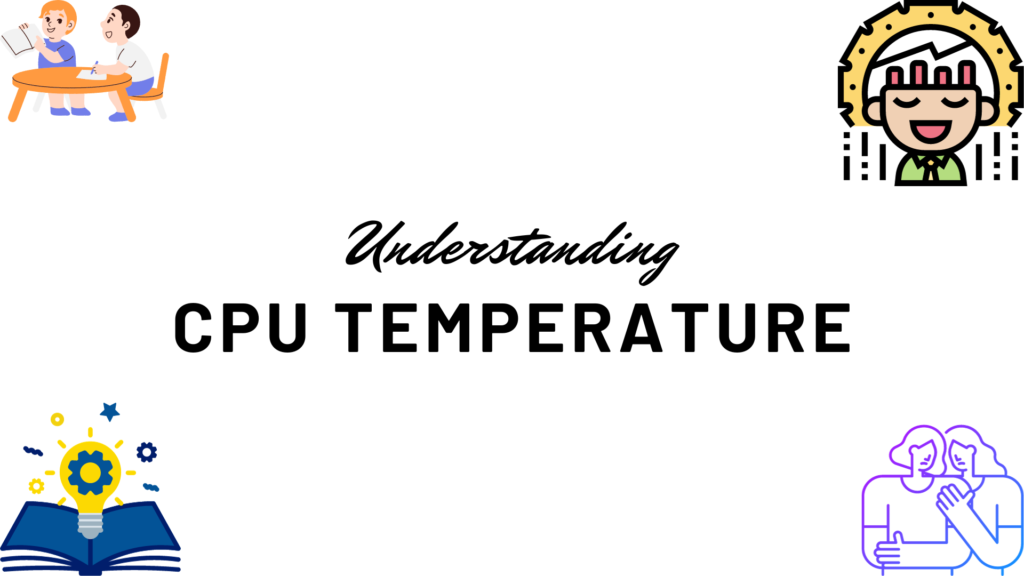Physical Address
304 North Cardinal St.
Dorchester Center, MA 02124
Physical Address
304 North Cardinal St.
Dorchester Center, MA 02124

What temp should my CPU be? Keeping an eye on your CPU temperature is pretty crucial for your computer’s well-being. Think of it like the body temperature for your PC – it needs to stay within a certain range to function properly. If it gets too hot, your CPU might slow down to cool off, impacting performance. Worse yet, prolonged overheating can even damage the hardware. Regularly checking the temperature is like giving your computer a health check-up, ensuring it runs smoothly and doesn’t unexpectedly bail on you. It’s especially important for gamers and those who like to push their computers to the limit – you wouldn’t want things heating up too much during those intense gaming sessions or heavy tasks.
so let’s talk about the sweet spot for your CPU temperature. Ideally, you want your computer to run not too hot, not too cold, but just right. For most CPUs, a temperature range of 40 to 70 degrees Celsius (104 to 158 degrees Fahrenheit) is like the Goldilocks zone – perfect for performance without risking overheating. Below 40°C, it might be running a bit chilly, and above 70°C, things could get a tad too toasty, leading to performance hiccups or, worse, hardware damage. So, aim for that cozy middle ground, and your computer will thank you with smooth, trouble-free operation.

Alright, let’s talk about CPU temperature—it’s essentially how hot or cool your computer’s brain, the CPU, is running. Imagine it like checking if your cup of coffee is too hot to sip or just right. We measure this in degrees Celsius (or Fahrenheit if you prefer). So, when you wonder, “What temp should my CPU be?” and see a CPU temperature of, say, 60 degrees Celsius, that’s like the temperature sweet spot – not too chilly, not scorching hot. Monitoring tools in your computer keep an eye on this to make sure your CPU doesn’t get too toasty, keeping everything running smoothly and avoiding any potential meltdowns.
What temp should my CPU be The answer is temperature dance of your computer is choreographed by a few key players. Cooling fans and heat sinks act as the cool squad, regulating CPU heat. Your PC prefers a room that’s not too hot or cold, mirroring Goldilocks’ taste. Heavy tasks, like a digital workout, can turn up the heat, and overclocking is like putting your system on turbo mode, demanding extra chill. Monitoring these factors is the backstage pass to ensure your computer keeps its cool and doesn’t break a sweat during its digital performance.

Defining the optimal temperature zone for your computer is like finding the perfect comfort level. Ideally, the sweet spot for your CPU, the brain of your computer, falls between 40 to 70 degrees Celsius (104 to 158 degrees Fahrenheit). Below 40°C, it might feel a bit too cool, and above 70°C, things can get uncomfortably warm, risking performance issues. Maintaining this Goldilocks zone ensures that your computer operates at its best, delivering smooth performance without the risk of overheating or slowing down. So, keep it cozy between these temperatures, and your computer will thank you with reliable and efficient functioning.
Messing with your CPU’s temperature is like walking a tightrope. Go below 40°C, and you’ll encounter sluggish performance and potential system instability. On the flip side, surpassing 70°C spells trouble, triggering overheating and a noticeable drop in performance due to thermal throttling. It’s a delicate balance. Regularly checking your CPU’s temperature is crucial. Wondering, “What temp should my CPU be?” Aim for the sweet spot within the recommended range—keep it cozy, and your computer will thank you with optimal performance and a longer lifespan.

Picture software-based monitoring tools as your computer’s personal temperature detectives. They keep a watchful eye on your CPU, making sure it’s not throwing a digital fever party. Apps like Core Temp, HWMonitor, and SpeedFan act like health trackers, giving you real-time updates on your computer’s temperature status. It’s like having a thermostat for your tech. They not only tell you the current temperature but also keep a record of its past behavior, helping you spot any unusual trends. So, with these digital guardians, you can ensure your computer stays cool, calm, and collected, performing at its best without breaking a sweat.
Maintaining your computer’s physical health is very important for effective temperature control and optimal performance. Wondering, “What temp should my CPU be?” Regular upkeep, similar to a tech spa day, involves cleaning cooling fans and heat sinks to prevent dust buildup, which can impede airflow and elevate temperatures. Ensure your computer has sufficient space for proper ventilation, akin to letting it breathe freely. Consider its environmental surroundings, shielding it from direct sunlight and maintaining a moderate room temperature. Upgrading your cooling system or applying fresh thermal paste can be game-changing. Treating your computer well can ensure it stays cool, preventing overheating, and also affects its efficiency.

Proper ventilation for your computer is like giving it a breath of fresh air. First things first, clear the clutter around it, because just like us, it needs room to breathe. Ensure those cooling fans have a clear path; think of them as your computer’s lungs, inhaling and exhaling cool air. Position your computer in a well-ventilated spot, avoiding the suffocating embrace of tight spaces. If you’re feeling extra fancy, consider adding extra fans or optimizing airflow with case modifications. It’s all about creating a cool breeze for your tech buddy, ensuring it stays comfortable and doesn’t break a sweat during those digital marathons.
Let’s talk overclocking and your computer’s temp. It’s like giving your engine a boost for more speed, but here’s the kicker: it heats up. When you overclock, your CPU works harder, cranking up the temp. Picture your computer running a marathon at a sprinter’s pace. To handle this, beefier cooling helps. So, while overclocking adds power, watch that temp gauge to avoid your computer sweating too much.
Ensuring your computer’s temperature stays in your comfort zone is like treating it to a VIP experience, ensuring both a long lifespan and peak performance. It’s the cool factor that keeps your CPU from throwing a tantrum. Proper temperature management acts as a digital guardian, preventing overheating issues and potential hardware meltdowns. Whether you’re wondering, “what temperature should my cpu be?” and diving into demanding tasks, experimenting with overclocking, or simply maintaining a clutter-free setup, it all boils down to this crucial aspect. Embrace the significance of temperature management – your computer will repay you with reliable, smooth operations, providing a worry-free digital experience.
Ensuring your computer’s longevity and peak performance is like giving it the VIP treatment for a long and happy life. It’s all about playing the long game! Keep an eye on temperature – not too hot, not too cold, just right. Regular check-ups, like cleaning up dust bunnies and ensuring proper airflow, are the equivalent of health boosts for your tech buddy. Avoiding extreme temperatures and providing a comfortable living space ensures your computer ages like fine wine. Think of it as the secret sauce for a reliable, efficient, and long-lasting digital companion. So, show your computer some love, and it’ll keep delivering its A-game.